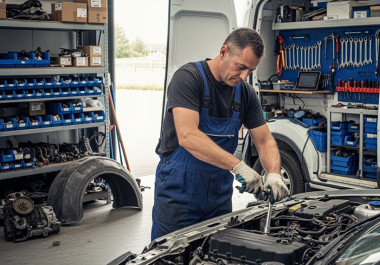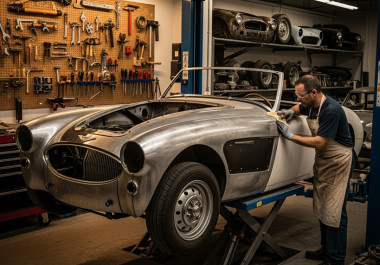It’s a known quirk of human psychology that we tend to assign human characteristics to inanimate objects, especially if they’re treasured possessions, or if we have a lot of contact with them. Cars are a prime example. (The experts over at Scrap Car Network once went into more of the scientific detail on why we name our cars.) If you’ve ever bought a car from one of our online car auctions, it might be something you’ve indulged in, too!
And while it’s often a happy, innocent connection, that anthropomorphism can get decidedly unsettling. After all, cars aren’t always the silent, reliable machines we’d like them to be. Sometimes they produce strange, unnerving noises that can send a chill down your spine, especially when you’re driving alone on a dark, misty road. These sounds might not be the work of malevolent spirits, but they can definitely be signs of trouble under the bonnet.
The ghostly whine
A high-pitched whine creeping in as you drive is enough to set anyone on edge. Often, this is due to problems with the power steering or transmission. If it’s the power steering, low fluid levels or a leak is likely the cause. When fluid runs low, the pump strains to keep up, leading to that ghostly whine. It’s best not to ignore it, as it could lead to a complete power steering failure. Transmission-related whines are potentially even more serious, pointing to worn bearings or gears inside the gearbox. Left unchecked, these can also lead to costly damage, with repairs ranging from a fluid top-up to a full transmission rebuild, depending on the severity.
The nature of the whine can also provide clues about the underlying issue. A whine that increases with engine speed often points to transmission problems, while one that occurs only when turning could indicate power steering troubles. Listening closely and identifying patterns in the sound can be helpful in diagnosing the issue more effectively – whether you’ve got the requisite mechanical knowledge yourself, or you’re relying on a professional.
The death rattle
A deep rattling from under the bonnet signals trouble, often tied to loose or damaged parts like the exhaust or engine mounts. That can be troubling enough in itself. But if it’s coming from inside the engine, it’s even more concerning - possibly a worn timing chain or rod bearings. When the timing chain starts to fail, that risks the engine falling out of sync, which can lead to catastrophic damage. Rod bearings also play a crucial role in keeping the engine running smoothly, and worn bearings can result in engine seizure. Repairs could be minor, like replacing a loose exhaust bracket, or major, such as fixing a failing timing chain or bearings.
The location of the rattle can also provide important diagnostic clues. For instance, if the rattle changes with engine speed, it may indicate issues related to the internals of the engine. If it’s a constant noise on the other hand, it might be a sign of something more mechanical, like loose components in the exhaust system. Either way, the key is prompt diagnosis – waiting too long could lead to more severe damage and higher repair costs, not to mention the risk of being stranded on the road.
The screech of doom
That spine-tingling screech when you hit the brakes is usually a sign your brake pads are wearing thin. As they wear down, the metal backing can grind against the rotors, causing that alarming sound. This screech is a warning that you need to replace your brake pads before they damage the more expensive rotors. Left unchecked, you’re not just looking at higher repair costs - you’re also risking brake failure. The fix is generally straightforward: new brake pads, and possibly rotor resurfacing or replacement if the damage is severe.
Sometimes, screeching can also occur due to dirt or debris caught between the brake pads and rotors, which can create a similar noise without necessarily indicating that the pads need replacing. Regular cleaning of the braking components can help prevent this issue, ensuring smoother operation and prolonging the life of your brakes. If the screech persists after replacing the pads, a thorough inspection of the entire braking system is probably a good idea, to identify any underlying issues that could be affecting performance.
The sinister knocking
A knocking sound from the engine can feel like a death knell. It’s often caused by engine knocking or worn rod bearings. Engine knocking, also called pinging, happens when fuel ignites prematurely in the cylinder, damaging pistons and other engine components over time. Poor-quality fuel or improper timing can cause this issue. If it’s the rod bearings, the stakes are even higher - complete failure can mean total engine destruction. Suspension issues like worn ball joints or bushings can also cause knocking, though this is more likely over bumps. Immediate attention is needed, or the consequences could be costly.
If you notice it, the first thing to do is start monitoring the frequency and intensity of the knocking can provide valuable information. If the noise occurs only under load or when accelerating, it might indicate that adjustments to the fuel mixture or ignition timing are needed. If the knocking is more persistent and loud, stop driving (if you’re doing so) and make sure that the car isn’t driven again until it’s had some professional attention.
And of course, if you do ever find yourself in need of any spare parts to make repairs – or even a new second-hand car entirely – then you’re in exactly the right place. At RAW2K, we refresh our online car auctions on a daily and weekly basis, showcasing a variety of makes and models from some of the world’s top manufacturers, including popular brands like Volkswagen, Ford, Renault, and many more. Why not take a look around, and see what you can find?




